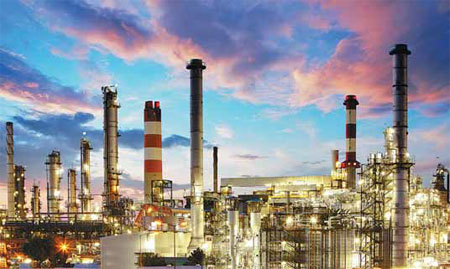Investment magnet welcomes more cooperation
|
Atyrau Oil Refinery Plant on the northeast coast of the Caspian Sea. Photos Provided to China Daily |
Development and political stability attracts foreigners to biggest central Asian country
Kazakhstan's GDP per capita is among the top three countries of the Commonwealth of Independent States.
According to data from the Agency of Statistics of Kazakhstan, the country's GDP per capita was more than $12,000 in 2012 and rose to $12,900 in 2013.
Kazakhstan has become a regional magnet for investment and the country may become the most attractive place in Eurasia for investment and technology transfer, said president of Kazakhstan Nursultan Nazarbayev.
Data from World Bank shows that the biggest central Asian country joined the list of countries with a per capita income higher than average after decades of development.
More and more foreign companies that want to explore the central Asia market choose Kazakhstan as it has unique advantages in the region, said Kairat Karmanov, deputy chairman of Kaznex Invest.
Foreign investment jumped from $7.9 billion in 2005 to $24.1 billion in 2013, according to data from the Ministry of Industry and New Technologies of Kazakhstan.
Kazakhstan has a Custom Union with Russia and Belarus and they have preferences that can be provided by the Kazakh government, said Karmanov.
He also said that the country maintained good relationships with other countries in the region.
Zhumatay Salimov, deputy chairman of the National Agency for Technological Development, said that political stability was the country's biggest advantage, as foreign investors prefer sustained policies and a stable market.
He said that Kazakhstan would join WTO soon, which would be another advantage.
Kazakhstan started its process of accession to the WTO in 1996, the same year the nation obtained observer status within the organization.
Kazakhstan plans to enter the WTO in 2014, Tengrinews reported in November last year.
"We are still negotiating over subsidies for the country's agriculture. Accession is only possible after we have agreed on the amount of subsidies in line with Kazakhstan's mid and long-term plans. Hopefully, it will happen next year," Zhanar Aitzhanova, minister for Economic Integration, told reporters after speaking in the country's Majilis, or the lower house of the Kazakh parliament.
In order to get ready for entry to the WTO and enhance competitiveness of the local manufacturing industry, the country has started to match their technology standards.
Astana is preparing to host the International Specialized Exhibition in 2017 and more and more high-rise buildings are expected to line the city's streets.
Kazakhstan is looking forward to having more foreign construction companies, planning and designing consultants, energy-efficient technology and alternative energy source experts and tourist companies participate in the preparation.
In order to attract foreign investment President Nazarbayev signed a law to improve the management and function of special economic zones in July 2011. In 2013 amendments were made to the law.
At present 10 special economic zones operate in Kazakhstan and industrial and manufacturing zones are located all over the country, including one near the new capital Astana.
In July 2013 there were 492 registered participants in the zones.
An official said that there were various preferences for participants in the special economic zones. For example participants can enjoy privileges such as exemption from corporate income tax, land tax, property tax and value added tax and in some economic zones, like the Innovation Technologies Park, additional tax benefits are applied.
Further cooperation
As part of the delegation of Kazakh Deputy Prime Minister Aset Isekeshev, Salimov visited China in April and talked with several Chinese companies.
He said although China was a major partner with Kazakhstan in terms of trade the Kazakh government was not satisfied.
A total of 90 percent of trade between the two countries is in either oil and gas, or mineral resources.
Kazakhstan is promoting and supporting innovation programs and high-tech industries and is looking for opportunities for further cooperation.
Rassul Kizatov, managing director of Kaznex Invest, said they signed a memorandum with a Chinese company in the resource sector.
"We are looking forward to cooperating with China in non-resource sectors, such as manufacturing," he said.
Kazakh telecom companies are involved in several projects with Chinese firms Huawei and ZTE and Kazakh company KRIS-Service signed a partnership agreement with Chinese IT enterprise Insprur.
The Kazakh Ministry of Industry and New Technologies joined hands with Chinese corporation Shenyang Yuanda Enterprises Group to start construction of an elevator factory in an industrial zone of Almaty.
With Kazakhstan's development and the approaching expo in 2017 it is anticipated that there will be more opportunities for Chinese companies to go into central Asian markets.
"I insist that the potential cooperation with China is much bigger than what we have now," said Salimov. "So if you look into central Asia, I think for China the best option would be Kazakhstan."
renqi@chinadaily.com.cn



















